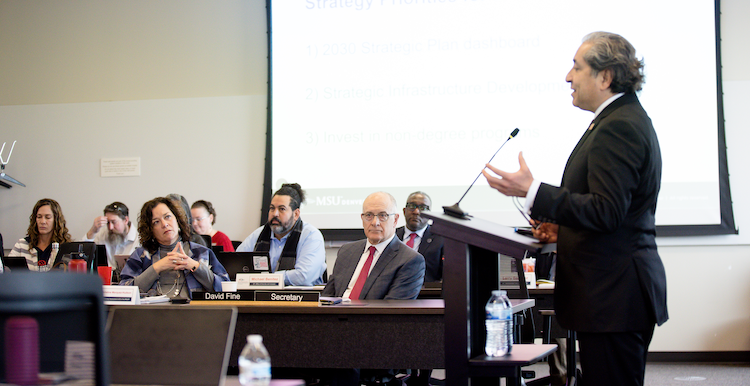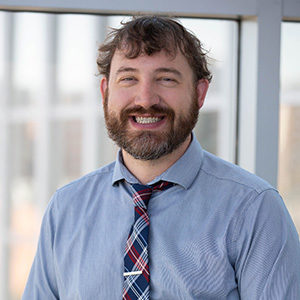

Stuff That Works was the top topic for strategic discussion at Friday’s meeting of Metropolitan State University’s Board of Trustees, with Chief Strategy Officer James Mejia providing updates on several University strategies with high return on investment.
- Roadrunners in the Pathways to Possible program, which recruits and supports underserved high school students, have taken greater course loads, earned higher grade-point averages and persisted at better rates than expected for a group of students that is 93% first-generation and 65% Pell-eligible.
- The spring Earn and Learn cohort will be the largest in the program’s history, providing paid experiential learning for 75 students. This increase showcases the launch of our graduate cohort for the first time. MSU Denver has worked diligently to bring this equity-focused program to support even more of our student population participating in unpaid internships, field placements and off-campus research opportunities.
- Dean’s Grants offered to nearly 700 students identified as unlikely to return in this past fall led to 256 students (37%) registering for the fall semester.
- The Roadrunner Promise, which covers tuition and fees for low-income students, has preliminarily been awarded to 5,710 students and the Indigenous and Native Peoples’ Grant to 166 students, pending final post-census numbers.
- The University invested $160,000 to hire two new College Credit in High School staff members, and projected revenue for the program this spring is more than $260,000.
- The Rowdy Pit Stop portal helping students track degree progress was used more than 2,200 times the week it launched in October.
- MSU Denver has accelerated adoption of virtual and augmented reality, with the School of Hospitality set to offer the first VR module and course in May.
The Strategy Office continues to work on the 2030 Strategic Plan dashboard as well as strategic infrastructure developments such as housing and investing in nondegree programs, Mejia said.
“We’re building the infrastructure that matches our aggressive programming and investing in the things we know are working, doubling down and catalyzing (MSU Denver’s) launch,” Mejia said.
Legislative update
Director of Government Affairs Kaycee Gerhart briefed the board on MSU Denver’s legislative priorities this session, which include a request for a $144 million funding increase and 4% tuition authority for higher education in collaboration with the other colleges and universities in Colorado. That would translate to an approximately $13 million base increase for MSU Denver, Gerhart said.
The University is also seeking capital funds for its Health Institute tower ($6.6 million), Classroom-to-Career Hub ($17.9 million) and two information-technology projects that are already in progress, network-infrastructure improvements and the Workday implementation.
MSU Denver has also registered official support for three bills: expansion of a teacher stipend program, the creation of a first-generation-serving designation and extending the maximum contract length for nontenure-track faculty members. Gerhart said the University is engaged in legislation in development related to stackable credentials, college affordability and workforce development as well.
Faculty-workload proposal
There was a lengthy discussion of the faculty-workload proposal presented by Provost Alfred Tatum, Ph.D., at the Academic and Student Affairs Committee meeting Thursday. The proposal would shift the number of classes that faculty members teach per semester to make room for research, advising and wraparound student services. The trustees directed a pause on implementation of a 3-3 teaching load to allow University leadership to model its implications and address additional questions prior to a final determination, with a discussion planned for the fall 2023 Board retreat.
“There’s no doubt in my mind on how this is going to benefit our students,” said Trustee Marissa Molina, who chairs the ASA Committee. “We have to ensure that we have all the data and can analyze that data to really understand how we create a sustainable path into that shift. We are committed to ensuring that this continues to be a collaborative conversation.”
New trustees
Board appointees Jerry Glick and Olivia Mendoza attended their first meetings Thursday and Friday as nonvoting members, with their appointments pending confirmation by the state’s Senate Education Committee.
Mendoza shared that she was an undocumented immigrant for most of her childhood, while Glick said the University’s support of undocumented students is a key reason why he wanted to be a trustee as well.
Minority-Serving Institution strategy
Chief of Staff Edward Brown shared updates on the University’s work serving Black Coloradans, which is being led by a steering committee of campus stakeholders with a consultant from The Equity Project. The committee will use a number of targeted internal and external focus groups to prepare a white paper with recommended strategies for the Office of the President by mid-May.
More news and notes:
- Advancement has raised more than $9 million this fiscal year with a goal of $15 million by the end of June. The multi-year fundraising campaign has progressed more than 41% of the way with over $31 million raised toward the goal of $75 million.
- The trustees approved tenure for Inge Wefes, Ph.D., associate vice president of Graduate Studies in the Biology Department, and an honorary Master of Education degree for community leader Anna Jo Garcia Haynes, to be awarded at spring Commencement.
- Aging Services Leadership was approved as a new major, while four minors were approved in English (two), Health Professions, and Human Performance and Sport.
- Michael Benitez Jr., Ph.D., vice president for Diversity and Inclusion, has been elected to the board of directors for the National Association of Diversity Officers in Higher Education.
- General Counsel David Fine was named one of the Top 25 Attorneys in Colorado in December by Attorney Intel.
- The MSU Denver aerobatics team won the collegiate national championship for the second year in a row and fourth time in six years.
- The Auraria Campus master plan is in development with a target completion in 2024.
- Beginning in June, the board will convene quarterly with meetings in June, September, January and March each year. The trustees made the change to a more regular cadence to better align with key decision-making dates for University business. Recordings of public board meetings can be found online.


